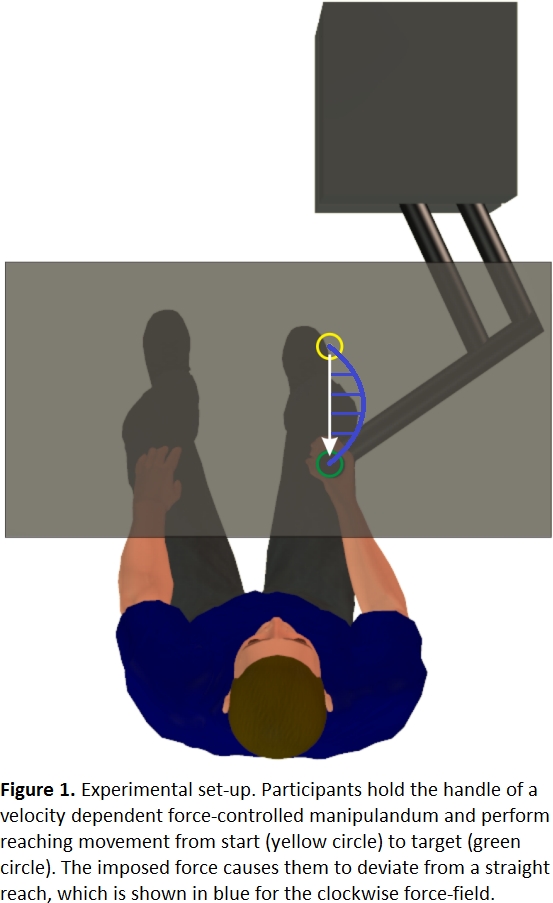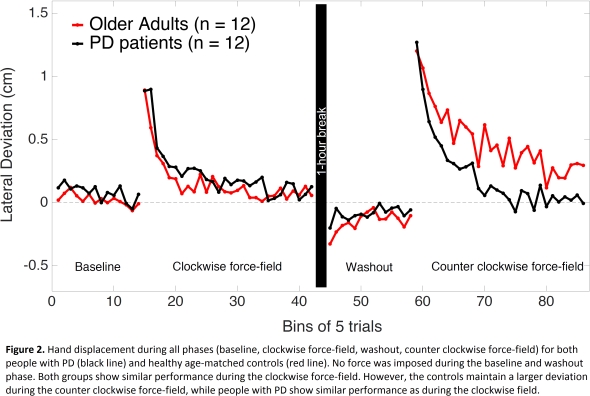Session Information
Date: Wednesday, June 22, 2016
Session Title: Parkinson's disease: Neuroimaging and neurophysiology
Session Time: 12:00pm-1:30pm
Location: Exhibit Hall located in Hall B, Level 2
Objective: We sought to investigate the differences in motor adaptation and motor memory between people with Parkinson’s disease (PD) and healthy age-matched controls by using force-field adaptation performed with the upper-limb.
Background: Previous studies have suggested that people with PD are not as efficient as age-matched controls in retaining certain kinds of motor memory. We investigated this phenomenon by testing for interference effects in motor adaptation. Motor adaptation is the process responsible for maintaining motor accuracy in response to altered sensory input. If a participant learns an adapted state the ability to learn a second adaptation – one that is incongruent to the first state – worsens. This is thought to occur because memory of the first adaptation interferes with learning the second. We hypothesized that if people with PD do not retain motor memory as well as age-matched controls, they would show less interference.
Methods: People with PD and healthy age-matched controls were tested for adaptation and interference using a force-field adaptation task.  Both groups adapted to a clockwise force-field (10 N/m/s). After a break and a period of washout the participants learned to reach through an identical but opposite (counter clockwise) force-field. Differences in learning rates in the second force-field condition allowed us to measure how much the memory of the first force-field interfered with learning this new force-field. The break was either 1-hour or 24-hours to additionally measure the effect of sleep consolidation on motor memory.
Both groups adapted to a clockwise force-field (10 N/m/s). After a break and a period of washout the participants learned to reach through an identical but opposite (counter clockwise) force-field. Differences in learning rates in the second force-field condition allowed us to measure how much the memory of the first force-field interfered with learning this new force-field. The break was either 1-hour or 24-hours to additionally measure the effect of sleep consolidation on motor memory.
Results: Preliminary results indicate a disrupted motor memory in PD patients – compared to healthy age-matched controls – as those in the 1-hour group (PD, n=12) show similar performance during the counter field as during the initial field. This finding is in contrast to the age-matched control group (n=12) who show worse performance, which is in line with the expected interference effect.  The difference between the groups is reflected both in the hand displacement due to the force-field as well as in their force production.
The difference between the groups is reflected both in the hand displacement due to the force-field as well as in their force production.
Conclusions: These findings suggest a diminished interference effect in people with PD and supports our hypothesis that their motor memories are less robust. We suggest this is evidence for a role for the basal ganglia in motor memory. Where its dysfunction in PD results in a decline in motor memory, possibly through problems with formation, retrieval or context-dependent switching.
To cite this abstract in AMA style:
S. Voets, J.S. Brittain, M. Panouilleres, C. Miall, N. Jenkinson. Disrupted motor memory in Parkinson’s disease [abstract]. Mov Disord. 2016; 31 (suppl 2). https://www.mdsabstracts.org/abstract/disrupted-motor-memory-in-parkinsons-disease/. Accessed July 13, 2025.« Back to 2016 International Congress
MDS Abstracts - https://www.mdsabstracts.org/abstract/disrupted-motor-memory-in-parkinsons-disease/
